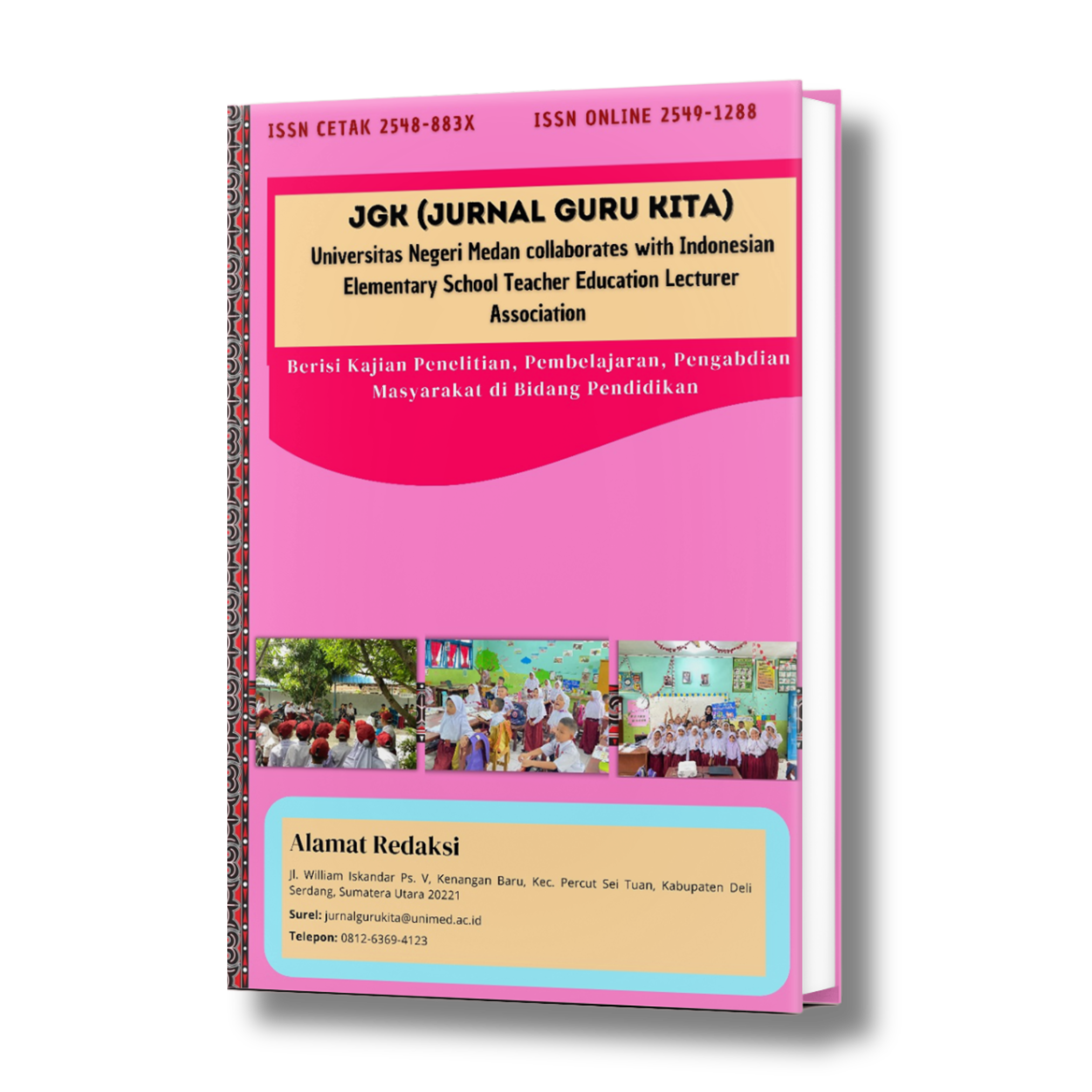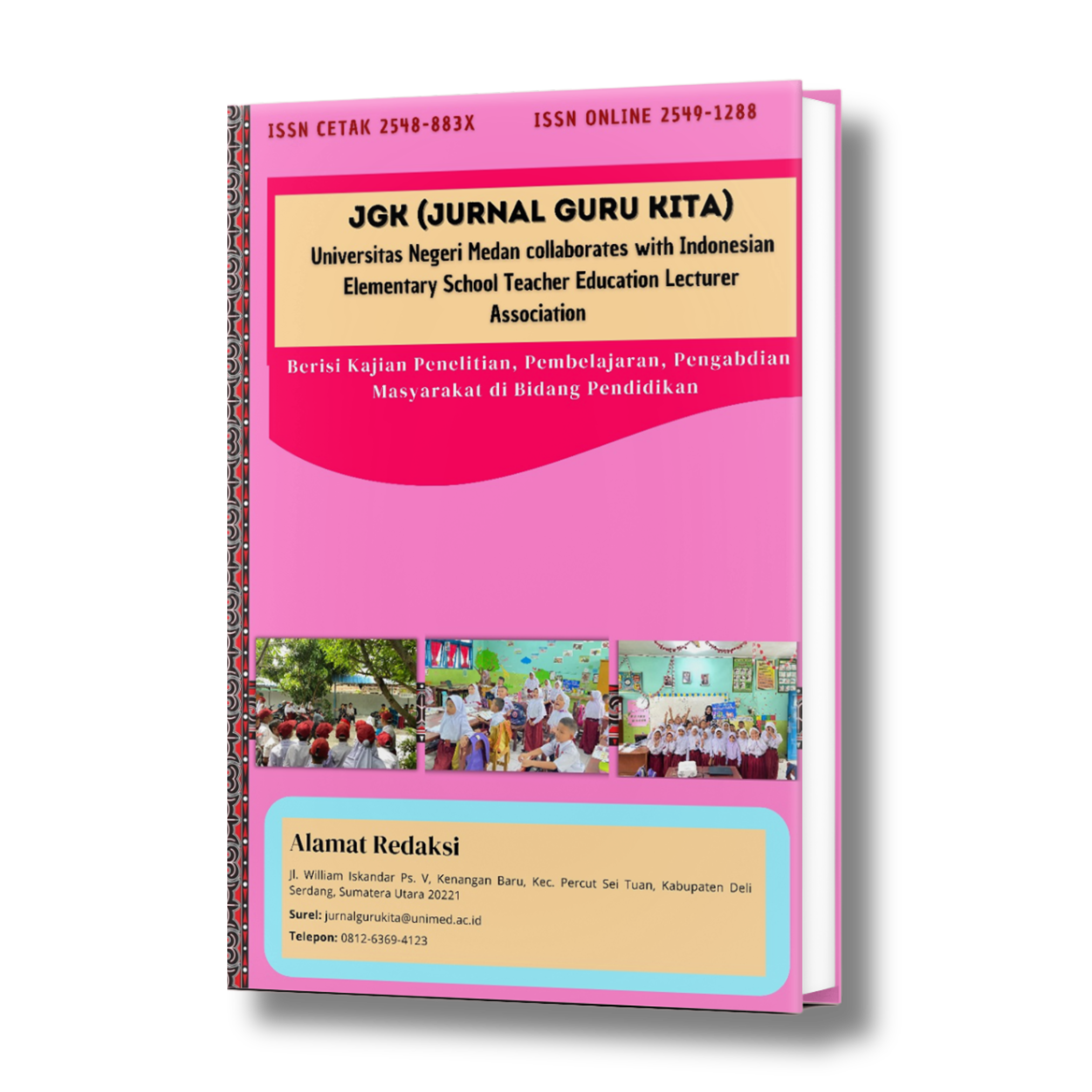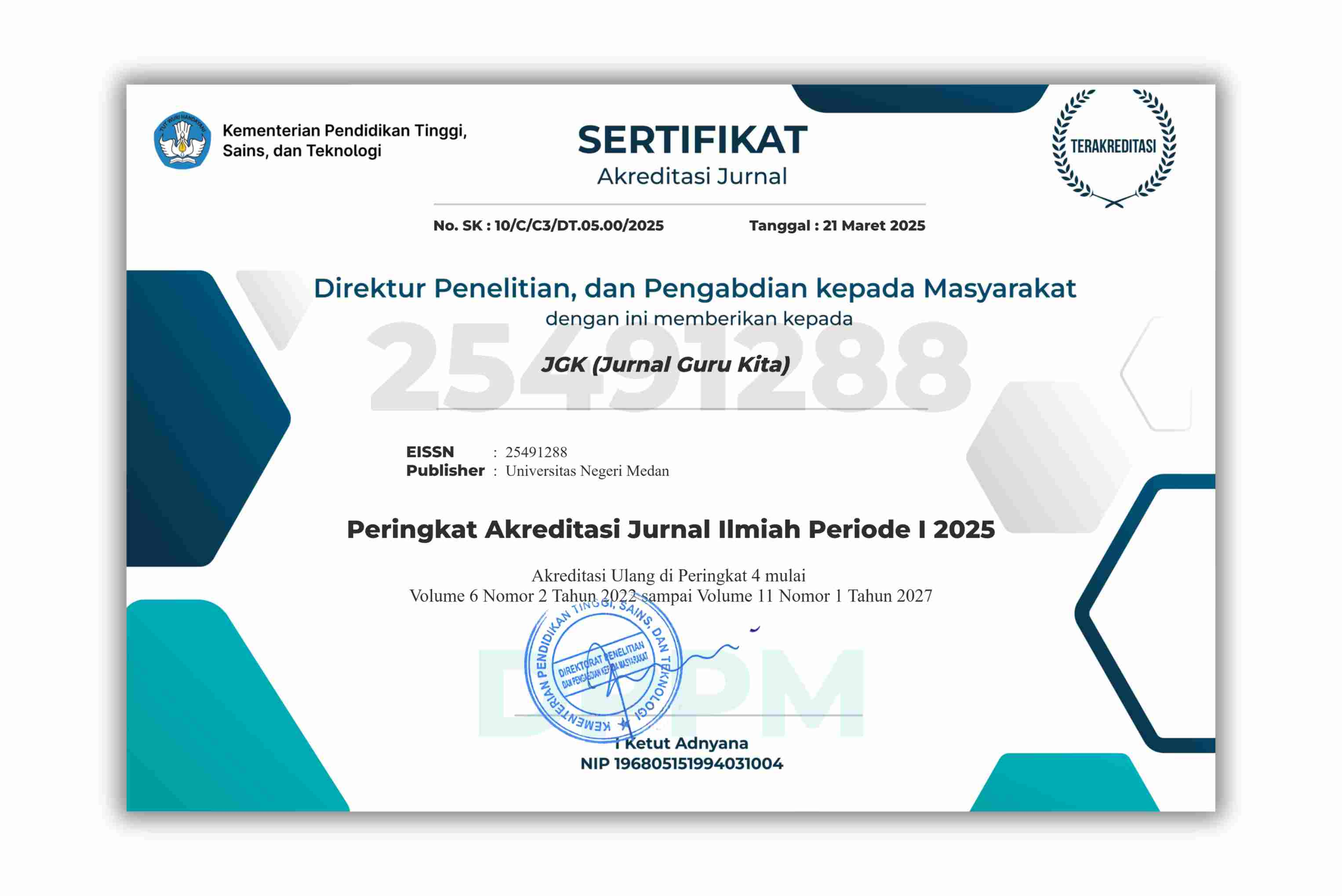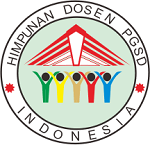Peran Keluarga, Sekolah, dan Masyarakat dalam Meningkatkan Karakter dan Hasil Belajar Peserta Didik di SDN Bulakan 01 Sukoharjo
DOI:
https://doi.org/10.24114/jgk.v9i4.66012Keywords:
Keluarga, Sekolah, Masyarakat, Karakter Peserta Didik, Hasil BelajarAbstract
Penelitian ini bertujuan untuk menganalisis peran keluarga, sekolah, dan masyarakat dalam membentuk karakter serta meningkatkan hasil belajar peserta didik di SDN Bulakan 01 Sukoharjo. Pendekatan penelitian yang digunakan adalah pendekatan kualitatif dengan desain studi kasus. Subjek penelitian terdiri atas kepala sekolah, guru, orang tua peserta didik, serta perwakilan masyarakat setempat. Teknik pengumpulan data dilakukan melalui observasi, wawancara mendalam, dan studi dokumentasi terhadap berbagai kegiatan pendidikan yang dilaksanakan di sekolah dan lingkungan sekitarnya. Data dianalisis menggunakan teknik analisis tematik untuk mengidentifikasi pola-pola peran yang dimainkan oleh keluarga, sekolah, dan masyarakat. Hasil penelitian menunjukkan bahwa keluarga berperan sebagai pendidik pertama yang menanamkan nilai moral, kedisiplinan, dan membangun motivasi belajar anak; sekolah memberikan pendidikan formal yang terstruktur melalui pembelajaran berbasis nilai dan kegiatan ekstrakurikuler; sedangkan masyarakat mendukung pembentukan karakter melalui kegiatan sosial, budaya, dan edukatif. Sinergi antara ketiga unsur tersebut menciptakan lingkungan belajar yang holistik dan kondusif bagi pengembangan karakter serta peningkatan prestasi peserta didik. Kesimpulannya, kolaborasi keluarga, sekolah, dan masyarakat merupakan faktor kunci dalam menciptakan pendidikan karakter yang efektif dan meningkatkan mutu pembelajaran di sekolah dasar.References
Adwiah, A. R., Aulia Faraz Tantia, & Intan Asyikin Rantikasari. (2023). Implementation of Storytelling Method with Folktales in Instilling Character Values in Children: A Study at ABA Warungboto Kindergarten. Golden Age: Jurnal Ilmiah Tumbuh Kembang Anak Usia Dini, 8(1), 47–57. https://doi.org/10.14421/jga.2023.81-05
Ahmed, S. K., Mohammed, R. A., Nashwan, A. J., Ibrahim, R. H., Abdalla, A. Q., M. Ameen, B. M., & Khdhir, R. M. (2025). Using thematic analysis in qualitative research. Journal of Medicine, Surgery, and Public Health, 6, 100198. https://doi.org/10.1016/j.glmedi.2025.100198
Al-Barakat, A., AlAli, R., Alotaibi, S., Alrashood, J., Abdullatif, A., & Zaher, A. (2025). Science Education as a Pathway to Sustainable Awareness: Teachers’ Perceptions on Fostering Understanding of Humans and the Environment: A Qualitative Study. Sustainability, 17(15), 7136. https://doi.org/10.3390/su17157136
Aleksić, G., Bebić-Crestany, D., & Kirsch, C. (2024). Factors influencing communication between parents and early childhood educators in multilingual Luxembourg. International Journal of Educational Research, 124, 102309. https://doi.org/10.1016/j.ijer.2023.102309
Allaste, A.-A., Beilmann, M., & Pirk, R. (2022). Non-formal and Informal Learning as Citizenship Education: the Views of Young People and Youth Policymakers. Journal of Applied Youth Studies, 5(1), 19–35. https://doi.org/10.1007/s43151-021-00059-z
Alzeer, J., Alzeer, J., & Benmerabet, H. (2023). The Development of Human Personality: A Comprehensive Overview. Psychological Disorders and Research, 1–8. https://doi.org/10.31487/j.PDR.2023.01.01
Arifin, A. (2021). Internalization of Pancasila Values and Nationalism in High Schools Through Citizenship Education. AL-ISHLAH: Jurnal Pendidikan, 13(3), 1899–1908. https://doi.org/10.35445/alishlah.v13i3.1238
Arifin, S., Chotib, M., Rahayu, N. W. I., Hosaini, H., & Samsudi, W. (2024). Kiai’s Transformative Leadership in Developing an Organizational Culture of Islamic Boarding Schools: Multicase Study. AL-ISHLAH: Jurnal Pendidikan, 16(2). https://doi.org/10.35445/alishlah.v16i2.5325
Aryadiningrat, I. N. L. H., Sundawa, D., & Suryadi, K. (2023). Forming the Character of Discipline and Responsibility Through Character Education. Indonesian Values and Character Education Journal, 6(1), 82–92. https://doi.org/10.23887/ivcej.v6i1.62618
Assen, J. H. E., & Otting, H. (2022). Teachers’ collective learning: To what extent do facilitators stimulate the use of social context, theory, and practice as sources for learning? Teaching and Teacher Education, 114, 103702. https://doi.org/10.1016/j.tate.2022.103702
Beaulieu, L., & Jimenez‐Gomez, C. (2022). Cultural responsiveness in applied behavior analysis: Self‐assessment. Journal of Applied Behavior Analysis, 55(2), 337–356. https://doi.org/10.1002/jaba.907
Biwer, F., Wiradhany, W., oude Egbrink, M., Hospers, H., Wasenitz, S., Jansen, W., & de Bruin, A. (2021). Changes and Adaptations: How University Students Self-Regulate Their Online Learning During the COVID-19 Pandemic. Frontiers in Psychology, 12. https://doi.org/10.3389/fpsyg.2021.642593
C Coker, D. (2022). A Thematic Analysis of the Structure of Delimitations in the Dissertation. International Journal of Doctoral Studies, 17, 141–159. https://doi.org/10.28945/4939
Carrington, S., Park, E., McKay, L., Saggers, B., Harper-Hill, K., & Somerwil, T. (2024). Evidence of transformative leadership for inclusive practice. Teaching and Teacher Education, 141, 104466. https://doi.org/10.1016/j.tate.2023.104466
Casmana, A. R., Dewantara, J. A., Timoera, D. A., Kusmawati, A. P., & Syafrudin, I. (2023). Global citizenship: preparing the younger generation to possess pro-environment behavior, mutual assistance and tolerance awareness through school engagement. Globalisation, Societies and Education, 21(1), 15–32. https://doi.org/10.1080/14767724.2021.2013167
Clark, S., & Sayers, E. (2025). Skateparks as communities of care: the role of skateboarding in girls’ and non-binary youth’s mental health recovery during lockdown. Pedagogy, Culture & Society, 33(2), 613–632. https://doi.org/10.1080/14681366.2023.2258382
Cojocaru, S. (2023). Transformative Social and Emotional Learning (T-SEL): The Experiences of Teenagers Participating in Volunteer Club Activities in the Community. International Journal of Environmental Research and Public Health, 20(6), 4976. https://doi.org/10.3390/ijerph20064976
Creswell, J. W., & Creswell, J. D. (2017). Research design: Qualitative, quantitative, and mixed methods approaches. Sage publications.
Descals-Tomás, A., Rocabert-Beut, E., Abellán-Roselló, L., Gómez-Artiga, A., & Doménech-Betoret, F. (2021). Influence of Teacher and Family Support on University Student Motivation and Engagement. International Journal of Environmental Research and Public Health, 18(5), 2606. https://doi.org/10.3390/ijerph18052606
Edwards, D. B., DeMatthews, D., Spear, A., & Hartley, H. (2021). Community participation and empowerment in marginalised contexts: leveraging parental involvement, adult education, and community organising through social justice leadership. Compare: A Journal of Comparative and International Education, 51(8), 1190–1207. https://doi.org/10.1080/03057925.2020.1717927
El Zaatari, W., & Maalouf, I. (2022). How the Bronfenbrenner Bio-ecological System Theory Explains the Development of Students’ Sense of Belonging to School? Sage Open, 12(4). https://doi.org/10.1177/21582440221134089
Elsayed, W. (2024). Building a better society: The Vital role of Family’s social values in creating a culture of giving in young Children’s minds. Heliyon, 10(7), e29208. https://doi.org/10.1016/j.heliyon.2024.e29208
Essiz, O., & Mandrik, C. (2021). Intergenerational influence on sustainable consumer attitudes and behaviors: Roles of family communication and peer influence in environmental consumer socialization. Psychology & Marketing. https://doi.org/10.1002/mar.21540
Fenizia, E., & Parrello, S. (2025). School Trust and Sense of Belonging: Restoring Bonds and Promoting Well-Being in Schools. International Journal of Environmental Research and Public Health, 22(4), 498. https://doi.org/10.3390/ijerph22040498
García-Martínez, I., Montenegro-Rueda, M., Molina-Fernández, E., & Fernández-Batanero, J. M. (2021). Mapping teacher collaboration for school success. School Effectiveness and School Improvement, 32(4), 631–649. https://doi.org/10.1080/09243453.2021.1925700
Guay, F. (2022). Applying Self-Determination Theory to Education: Regulations Types, Psychological Needs, and Autonomy Supporting Behaviors. Canadian Journal of School Psychology, 37(1), 75–92. https://doi.org/10.1177/08295735211055355
Habyarimana, J. de D., Tugirumukiza, E., & Zhou, K. (2022). Physical Education and Sports: A Backbone of the Entire Community in the Twenty-First Century. International Journal of Environmental Research and Public Health, 19(12), 7296. https://doi.org/10.3390/ijerph19127296
Handayani, R., Purbasari, I., Setiawan, D., Ahmadi, F., & Praswanti, R. P. (2021). The Role of Family Education in Forming the Independent Character of Students in Elementary School. International Journal of Elementary Education, 5(2), 291. https://doi.org/10.23887/ijee.v5i2.30812
Harrison, T., & Laco, D. (2022). Where’s the character education in online higher education? Constructivism, virtue ethics and roles of online educators. E-Learning and Digital Media, 19(6), 555–573. https://doi.org/10.1177/20427530221104885
Idawati, I., Laksono, P. J., & Fatimatuzzahra, F. (2022). Active, Creative, Effective and Fun Learning with Character in 21st Century Skills. AL-ISHLAH: Jurnal Pendidikan, 14(3), 3667–3678. https://doi.org/10.35445/alishlah.v14i3.1490
Jansens, R., Prellwitz, M., Olofsson, A., & Lynch, H. (2023). The Representation of Children’s Participation in Guidelines for Planning and Designing Public Playspaces: A Scoping Review with “Best Fit” Framework Synthesis. International Journal of Environmental Research and Public Health, 20(10), 5823. https://doi.org/10.3390/ijerph20105823
Jiang, M., Gao, K., Wu, Z., & Guo, P. (2022). The influence of academic pressure on adolescents’ problem behavior: Chain mediating effects of self-control, parent–child conflict, and subjective well-being. Frontiers in Psychology, 13. https://doi.org/10.3389/fpsyg.2022.954330
Keung, C., & Cheung, A. (2023). A family-school-community partnership supporting play-based learning: A social capital perspective. Teaching and Teacher Education, 135, 104314. https://doi.org/10.1016/j.tate.2023.104314
Kong, S., & Wang, Y. (2021). The influence of parental support and perceived usefulness on students’ learning motivation and flow experience in visual programming: Investigation from a parent perspective. British Journal of Educational Technology, 52(4), 1749–1770. https://doi.org/10.1111/bjet.13071
Kuswandi, I., & Asmoni, A. (2025). A Character Formation Model in Integral Schools: An Analysis Through Weber’s Theory of Social Action. AL-ISHLAH: Jurnal Pendidikan, 17(1), 454–465. https://doi.org/10.35445/alishlah.v17i1.5455
Lakkala, S., Galkienė, A., Navaitienė, J., Cierpiałowska, T., Tomecek, S., & Uusiautti, S. (2021). Teachers Supporting Students in Collaborative Ways—An Analysis of Collaborative Work Creating Supportive Learning Environments for Every Student in a School: Cases from Austria, Finland, Lithuania, and Poland. Sustainability, 13(5), 2804. https://doi.org/10.3390/su13052804
Lim, W. M. (2025). What Is Qualitative Research? An Overview and Guidelines. Australasian Marketing Journal, 33(2), 199–229. https://doi.org/10.1177/14413582241264619
Lopez, M., Ruiz, M. O., Rovnaghi, C. R., Tam, G. K.-Y., Hiscox, J., Gotlib, I. H., Barr, D. A., Carrion, V. G., & Anand, K. J. S. (2021). The social ecology of childhood and early life adversity. Pediatric Research, 89(2), 353–367. https://doi.org/10.1038/s41390-020-01264-x
Ma, L., Liu, J., & Li, B. (2022). The association between teacher‐student relationship and academic achievement: The moderating effect of parental involvement. Psychology in the Schools, 59(2), 281–296. https://doi.org/10.1002/pits.22608
Manca, S., & Delfino, M. (2021). Adapting educational practices in emergency remote education: Continuity and change from a student perspective. British Journal of Educational Technology, 52(4), 1394–1413. https://doi.org/10.1111/bjet.13098
Marfán, J. (2025). Comparing the Role of Attitudes on the Enactment of Academic and Non-Academic Education Performance Indicators. Educational Policy, 39(6), 1139–1170. https://doi.org/10.1177/08959048241288505
Markey, D. K., O’ Brien, D. B., Kouta, D. C., Okantey, C., & O’ Donnell, D. C. (2021). Embracing classroom cultural diversity: Innovations for nurturing inclusive intercultural learning and culturally responsive teaching. Teaching and Learning in Nursing, 16(3), 258–262. https://doi.org/10.1016/j.teln.2021.01.008
Mehra, A., Gupta, O., & Avikal, S. (2023). Finding the combined effect of academic and non-academic performance on management students’ placement: A fuzzy logic approach. The International Journal of Management Education, 21(3), 100837. https://doi.org/10.1016/j.ijme.2023.100837
Miles, M. B., Huberman, A. M., & Saldaña, J. (2014). Qualitative data analysis: A methods sourcebook. 3rd. Thousand Oaks, CA: Sage.
Morgan, H. (2024). Using Triangulation and Crystallization to Make Qualitative Studies Trustworthy and Rigorous. The Qualitative Report. https://doi.org/10.46743/2160-3715/2024.6071
Mujahid, I. (2021). Islamic orthodoxy-based character education: creating moderate Muslim in a modern pesantren in Indonesia. Indonesian Journal of Islam and Muslim Societies, 11(2), 185–212. https://doi.org/10.18326/ijims.v11i2.185-212
Niu, S., Chen, Y., Zhang, R., Luo, R., & Feng, Y. (2023). Identifying and assessing the global causality among energy poverty, educational development, and public health from a novel perspective of natural resource policy optimization. Resources Policy, 83, 103770. https://doi.org/10.1016/j.resourpol.2023.103770
Purwaningsih, E. (2024). The Role of Metacognition in Character Education: A Case Study on Students’ Moral and Ethical Formation Strategies. Society, 12(1), 1–13. https://doi.org/10.33019/society.v12i1.617
Rachmad, Y. E., Rahman, A., Judijanto, L., Pudjiarti, E. S., Runtunuwu, P. C. H., Lestari, N. E., Wulandari, D., Suhirman, L., Rahmawati, F. A., & Mukhlis, I. R. (2024). Integrasi metode kuantitatif dan kualitatif: Panduan praktis penelitian campuran. PT. Green Pustaka Indonesia.
Rahayu, A. P., & Dong, Y. (2023). The relationship of extracurricular activities with students’ character education and influencing factors: a systematic literature review. Al-Ishlah: Jurnal Pendidikan, 15(1), 459–474.
Rahmawati, Y., Taylor, E., Taylor, P. C., Ridwan, A., & Mardiah, A. (2022). Students’ Engagement in Education as Sustainability: Implementing an Ethical Dilemma-STEAM Teaching Model in Chemistry Learning. Sustainability, 14(6), 3554. https://doi.org/10.3390/su14063554
Ricciardi, C., Manfra, L., Hartman, S., Bleiker, C., Dineheart, L., & Winsler, A. (2021). School readiness skills at age four predict academic achievement through 5th grade. Early Childhood Research Quarterly, 57, 110–120. https://doi.org/10.1016/j.ecresq.2021.05.006
Rosi, F., Rozi, F., Baharun, H., & Rizqiyah, E. F. (2022). Smart Parenting in Building Children’s Personality Through Religion-Based Habituation. AL-ISHLAH: Jurnal Pendidikan, 14(1), 731–740. https://doi.org/10.35445/alishlah.v14i1.1303
Sakban, A., & Sundawa, D. (2023). Character Education : Direction and Priority for National Character Development in Indonesia. Jurnal Kependidikan: Jurnal Hasil Penelitian Dan Kajian Kepustakaan Di Bidang Pendidikan, Pengajaran Dan Pembelajaran, 9(3), 794. https://doi.org/10.33394/jk.v9i3.7843
Sakti, S. A., Endraswara, S., & Rohman, A. (2024). Revitalizing local wisdom within character education through ethnopedagogy apporach: A case study on a preschool in Yogyakarta. Heliyon, 10(10), e31370. https://doi.org/10.1016/j.heliyon.2024.e31370
Saracho, O. N. (2023). Theories of Child Development and Their Impact on Early Childhood Education and Care. Early Childhood Education Journal, 51(1), 15–30. https://doi.org/10.1007/s10643-021-01271-5
Schiepe-Tiska, A., Dzhaparkulova, A., & Ziernwald, L. (2021). A Mixed-Methods Approach to Investigating Social and Emotional Learning at Schools: Teachers’ Familiarity, Beliefs, Training, and Perceived School Culture. Frontiers in Psychology, 12. https://doi.org/10.3389/fpsyg.2021.518634
ŞENGÖNÜL, T. (2022). A review of the relationship between parental involvement and children’s academic achievement and the role of family socioeconomic status in this relationship. Pegem Journal of Education and Instruction, 12(2). https://doi.org/10.47750/pegegog.12.02.04
Simac, J., Marcus, R., & Harper, C. (2021). Does non-formal education have lasting effects? Compare: A Journal of Comparative and International Education, 51(5), 706–724. https://doi.org/10.1080/03057925.2019.1669011
Sujarwo, S., Kusumawardani, E., Prasetyo, I., & Herwin, H. (2021). Parent involvement in adolescents’ education: A case study of partnership models. Cypriot Journal of Educational Sciences, 16(4), 1563–1581. https://doi.org/10.18844/cjes.v16i4.6013
Swain, J., & King, B. (2022). Using Informal Conversations in Qualitative Research. International Journal of Qualitative Methods, 21. https://doi.org/10.1177/16094069221085056
Yang, D., Chen, P., Wang, K., Li, Z., Zhang, C., & Huang, R. (2023). Parental Involvement and Student Engagement: A Review of the Literature. Sustainability, 15(7), 5859. https://doi.org/10.3390/su15075859
Yu, J., Kreijkes, P., & Salmela-Aro, K. (2022). Students’ growth mindset: Relation to teacher beliefs, teaching practices, and school climate. Learning and Instruction, 80, 101616. https://doi.org/10.1016/j.learninstruc.2022.101616
Yu, S., Liu, Y., & Guo, R. (2022). “How does my family affect me?” The family cultural capital impact on Chinese junior high school students’ academic achievement. Thinking Skills and Creativity, 46, 101146. https://doi.org/10.1016/j.tsc.2022.101146
Zainuri, A., & Huda, M. (2023). Empowering Cooperative Teamwork for Community Service Sustainability: Insights from Service Learning. Sustainability, 15(5), 4551. https://doi.org/10.3390/su15054551
Zhang, X., & Warner, M. E. (2024). Cross-Agency Collaboration to Address Rural Aging: The Role of County Government. Journal of Aging & Social Policy, 36(2), 302–324. https://doi.org/10.1080/08959420.2023.2230088
Downloads
Published
How to Cite
Issue
Section
License
Copyright (c) 2025 Farida Nugrahani, Alda Surya Than, Anisa Muthi'atul Hanifah, Dewi Shinta, Endah Lux Vitasari, I'if Zuraifah

This work is licensed under a Creative Commons Attribution-ShareAlike 4.0 International License.
Authors published with the JGK (Jurnal Guru Kita) agree to the following terms:
- Authors retain copyright and grant the journal the right of first publication with the work simultaneously licensed under a Creative Commons Attribution License (CC BY-SA 4.0) that allows others to share the work with an acknowledgment of the work's authorship and initial publication in this journal.
- Authors are able to enter into separate, additional contractual arrangements for the non-exclusive distribution of the journal's published version of the work (e.g., post it to an institutional repository or publish it in a book), with an acknowledgment of its initial publication in this journal.
- Authors are permitted and encouraged to post their work online (e.g., in institutional repositories or on their website) prior to and during the submission process, as it can lead to productive exchanges, as well as earlier and greater citation of published work. (See The Effect of Open Access)

























